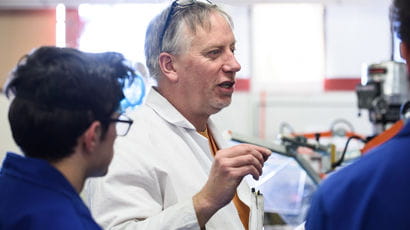Research calls for urgent focus to reduce impact of extreme heat on chronic diseases linked to urban environments

Advanced tools and more experimental studies are needed to urgently understand the impact of extreme heat events on urban health and wellbeing in the UK.
A new study, led by the University of the West of England (UWE Bristol), looked at gaps in our knowledge between the urban environment and heatwaves, indoor heat, and non-communicable diseases such as cancers, heart disease and asthma.
Published in Cities and Health, it examined what we already know about the effects of extreme heat, non-communicable diseases and related risk factors to help urban planners factor health considerations in the decision-making process.
Extreme heat is one of the largest weather-related causes of mortality, and a particular challenge for towns and cities that experience the ‘urban heat island effect’ (built up areas that are hotter than surrounding locations). It is most extreme in tall buildings with little shading and no outdoor spaces, such as older tenement blocks; often the most vulnerable are most affected.
The UK experienced three extreme heatwave events through summer 2022 with older and clinically vulnerable groups more at risk from suffering and death. Through climate change, high carbon emission scenarios point towards a rise in outdoor temperature in the UK of up to 5.4 degrees centigrade by 2070. It is widely reported that 2023 is expected to be the hottest on record globally.
Findings in the research consistently demonstrated that higher temperatures above defined heat thresholds were significantly associated with increased mortality rates. The studies included in the review reported that for every 1°C rise above the heat threshold, mortality increased by up to 2.5 per cent, emphasising the urgent need for mitigation strategies. Furthermore, the projected impact of temperature rise on heat-related mortality showed alarming figures, with estimates suggesting a potential 90 per cent increase in heat-related deaths between the 2020s and 2050s under a medium-emission scenario.
Researchers involved in the systematic review identified 24 eligible studies from a potential 244 on the topic. Fourteen of these examined the links between exposure to high ambient temperature and mortality in urban areas, while the remaining studies focused on emergency hospital admissions and years of life lost.
They found that there is very limited evidence of the effects of indoor heat exposure on a broad range of diseases and that advanced tools are needed to detect and attribute them. It strengthens arguments for planners and developers to mitigate the effects of urban heat islands. Researchers also recommend further investigations between indoor heat and death from any cause, heat stroke, hyperthermia, dehydration or hospital admissions.
Senior Lecturer in Public Health at UWE Bristol Dr Janet Ige said: “Danger to life from extreme heat in the UK is well documented but less is known about how it affects non-communicable disease. These are diseases that you can’t catch such as cancers, heart disease or asthma.
“Our systematic review of all the available academic literature in the UK reveals a gap in our knowledge, especially concerning indoor heat, that should be urgently addressed so we can work with urban developers and planners to protect communities.”
The study is part of TRUUD, a transdisciplinary research project led by the University of Bristol, which aims to reduce non-communicable disease (such as cancers, diabetes, obesity, mental ill-health and respiratory illness) and health inequalities linked to the quality of urban planning and development.
Programme Director for TRUUD Daniel Black added: “This work adds critical evidence to help us improve the way our towns and cities are planned to promote better health. Our pilot project revealed the lack of data in this area, so these new systematic reviews are providing essential missing data on flooding and overheating. A key innovation is the use of this data by our economists, who will incorporate it in to our HAUS database tool, which our different intervention teams are testing with national and local government, and private sector.”
Related news

12 December 2025
UWE Bristol’s environmentally conscious and student-focused accommodation wins three awards
Purdown View, the world's largest certified Passivhaus student accommodation development, has been recognised at Property Week Student Accommodation Awards.

13 November 2025
Alliance Medical and UWE Bristol launch UK’s first PET-CT postgraduate certificate
In a move set to transform imaging education, Alliance Medical (AML) and UWE Bristol have joined forces to co-design and develop the UK’s first PET-CT Postgraduate Certificate (PG Cert).

10 November 2025
Lessons from Low Traffic Neighbourhoods will drive better public engagement, study finds
Lessons from Low Traffic Neighbourhoods have informed a new toolkit to improve engagement with the public on challenging local street issues.

29 September 2025
Smartphone use hitting struggling pupils hardest, major study finds
Young people struggling with their studies at school are much more likely to have negative experiences on their smartphones than their better performing peers, a major new study has found.

11 September 2025
New study to investigate augmented reality as an intervention for emotionally based school avoidance
A UWE Bristol researcher will support a new study exploring whether an augmented reality board game can help young people with emotionally based school avoidance (EBSA).

28 July 2025
Student wins bronze medal at World Aquatics Championships on her graduation day
UWE Bristol sports rehabilitation student Izzy Thorpe made waves at the World Aquatics Championships winning a bronze medal in artistic swimming on the same day she was meant to be crossing the stage at her university graduation ceremony.

28 May 2025
Leading organisations fighting to end youth violence in cities join UWE Bristol event panel
Leaders from Bristol-based Empire Fighting Chance and Canadian non-profit REACH will speak at the next Bristol Distinguished Address Series.

09 May 2025
UWE Bristol among first universities in UK to introduce sanitary waste bins in male toilets
UWE Bristol is among the first universities in the UK to introduce sanitary waste bins in male toilets for the disposal of incontinence products.

11 April 2025
UWE Bristol academics among emerging scientific leaders to receive share of £7.6m for health research
Two UWE Bristol researchers are among the recipients of a £7.6 million investment from the Academy of Medical Sciences aimed at tackling urgent health challenges.

09 April 2025
New research to support a thriving health and care workforce is launched
A national research partnership will explore ways to support wellbeing and sustainability in the NHS and social care same day and urgent care workforce.

10 March 2025
UWE Bristol to explore the power of open water swimming at upcoming event with The Wave founder Nick Hounsfield
An inspiring tale of grit and resilience will be told to audiences at the first BDAS event of 2025 as UWE Bristol welcomes Nick Hounsfield, founder of The Wave.

28 February 2025
Paramedics in GP surgeries may ease workload but not NHS costs, study finds
Paramedics working in GP surgeries help reduce GP workload but do not contribute to cost savings to the NHS, according to the first major study of the clinical and cost-effectiveness of paramedic compared with GP consultations.
You may also be interested in

Media enquiries
Enquiries related to news releases and press and contacts for the media team.

Find an expert
Media contacts are invited to check out the vast range of subjects where UWE Bristol can offer up expert commentary.

Centre for Public Health and Wellbeing (CPHWB)
The Centre for Public Health and Wellbeing enables ethical and reflexive contributions to public health policy and practice.






